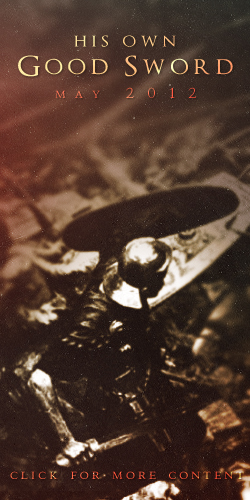His Own Good Sword has received a lovely review from Maureen over at By Singing Light. Take a look here!
Sunday Sample #10
Six more sentences from ye olde WIP:
He brushed his hand against his cloak and got to his feet.
“We should go,” he said to Morlyn. His breath was a silvery cloud on the air.
“If this were a trap they’d have sprung it by now,” Morlyn said.
“It’s still a risk, being in the open, being this close.”
“Give him time,” Morlyn said.
Thoughts on A Farewell to Arms
I whipped out my Christmas wish list as soon as I learned that Scribner is releasing a new edition of A Farewell to Arms. Not only does this new edition include all the alternate endings, but early drafts of other key passages, Hemingway’s own 1948 introduction to the text, and new forewords from his son and grandson.
A Farewell to Arms being my all-time-favorite book, and Hemingway my favorite author-I’m a little excited.
Here follows a rambling collection of my thoughts on the book.
Two things bother me about A Farewell to Arms-or, rather, about the way people tend to approach it. The first is that a regrettable number of people haven’t approached it all. In my experience, The Old Man and the Sea tends to be the default Hemingway novel on school reading lists, possibly (she says cynically) because it’s the “cleanest” Hemingway novel. Consequently, it’s the only Hemingway novel that many students will get much exposure to. Don’t get me wrong; I love The Old Man and the Sea. But I think it’s a very poor introduction to Hemingway, and I understand why it turns readers off. So if you’ve never read A Farewell to Arms, and your primary reason is that the name “Hemingway” connotes dull novellas about men’s quests to catch giant fish-I urge you to give it a try. I really do think it’s Hemingway’s most approachable and rewarding novel.
The second thing that bothers me is that those who do approach A Farewell to Arms too often approach it as a romance. I’ve even seen A Farewell to Arms described in marketing as “a great love story.” If that’s what you’re expecting from the book, then I really don’t blame you for coming away bashing Hemingway as a misogynist who doesn’t understand the first thing about female characters or about romantic relationships (I’ve read Amazon reviews to that effect).
But I think it’s a mistake to read A Farewell to Arms as a love story. I think that’s much too narrow an interpretation.
Spoilers follow
First of all, I don’t believe the relationship between Lieutenant Henry and Catherine is driven by love. Lust? Yes. Obsession? Yes. But not love. At its most fundamental, love is self-sacrificial (patient, kind, enduring all things…), and there’s nothing self-sacrificial about Henry’s relationship with Catherine. It’s a remarkably childish, irresponsible relationship. Catherine doesn’t want to marry Henry, though that’s his preference (for the wrong reasons; he wants the façade of propriety it would allow them). Henry, meanwhile, is insensitive and controlling. He has no feelings for their baby; his only concern is for Catherine, the object of his unhealthy obsession. In the end, he loses them both.
So it doesn’t surprise me that people who read A Farewell to Arms as a love story come away unsatisfied. It’s one heck of a depressing love story.
In all honesty, I think there’s as much significance in Henry’s relationship with the priest as in Henry’s relationship with Catherine. Throughout the novel, the priest is the only character who enjoys Henry’s genuine respect. There’s an understanding between them that Henry doesn’t even share with Rinaldi-or Catherine, for that matter. Their relationship is ultimately left unresolved, but there’s an exchange between them that I think becomes key:
“It is in defeat that we become Christian.”
“The Austrians are Christians-except for the Bosnians.”
“I don’t mean technically Christian. I mean like Our Lord.”
Hemingway, Ernest. A Farewell to Arms. New York: Scribner, 1995.
Henry’s relationship with Catherine isn’t a love story. It’s a defeat. Henry sees Catherine’s body in the hospital bed and in the end, despite everything that’s passed between them, she’s nothing more to him than that-a body, cold and dead. “…[I]t wasn’t any good. It was like saying goodbye to a statue.” He walks out into the rain with the bitter realization of his own futility dawning on him.
The novel ends there. If it’s meant only to be a love story-what a profoundly disappointing ending. But if the priest is right, the ending is remarkably hopeful. (I’ll spare you a discourse on the allegorical implications of the rain.)
What better opportunity than the release of a spiffy new edition to give A Farewell to Arms a try? Just do me a favor and remember the admonition of the narrator in (500) Days of Summer: This is a story of boy meets girl, but you should know upfront this is not a love story.
Sunday Sample #9
Six sentences seemed a bit too restrictive for the excerpt this week, so I’ve renamed the post accordingly. Enjoy!
The name Souvin fell like a weight between us.
Perhaps my face showed nothing, but it took effort to keep my voice steady. I masked it with brazenness.
“There have been uprisings before, Lord Verun, and none of them have required the attentions of the High Commander. Is Souvin so different?”
“Not so different.” Verun’s voice was toneless. “Where there’s authority there will always be rebellion, Lady Risto. A native uprising is nothing. We’ve made that plain to the Cesini before. Doubtless we’ll do so again. But it wasn’t native work in Souvin.”
Out of the corner of my eye, I saw Luchian down his wine all at once and toss the empty bowl down onto the tabletop. The metal rang loudly against the marble in the sudden silence. We looked at each other, Verun and I. Verun’s eyes bored into mine, still glinting. Suddenly I wasn’t certain it was amusement.
Verun put down his own bowl and got to his feet. He bowed to me without lowering his gaze.
“It’s late,” he said. “Good fortune to you and Lord Marro in your marriage, Lady Risto.”

 Amanda McCrina is an author, artist, student, history buff, coffee connoisseur, cinephile, hockey fan, cat lady, and all-around nerd. She writes historical fiction and fantasy. She also writes about herself in third person. Her debut historical fantasy novel
Amanda McCrina is an author, artist, student, history buff, coffee connoisseur, cinephile, hockey fan, cat lady, and all-around nerd. She writes historical fiction and fantasy. She also writes about herself in third person. Her debut historical fantasy novel 